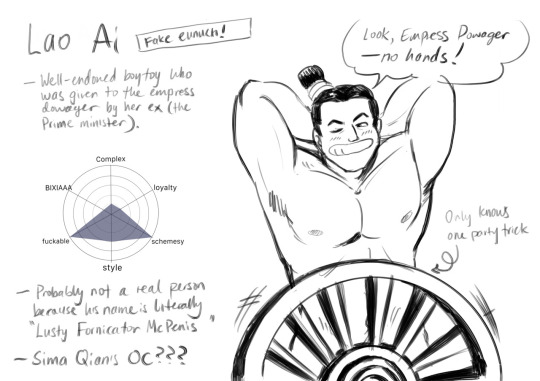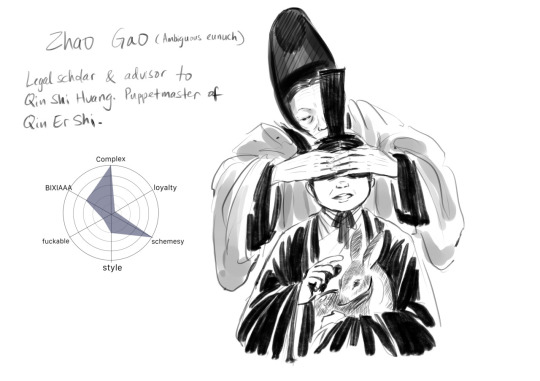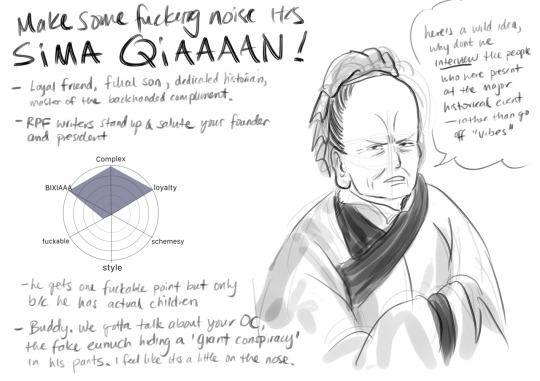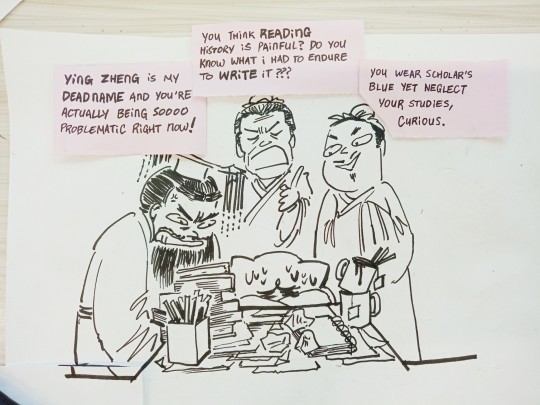#Sima qian
Explore tagged Tumblr posts
Text
i love the hilarious eunuch ranking system by @welcometothejianghu so i decided to make one based on (mostly) REAL historical chinese enunchs!
in chronological order:

Warring States Period long story short, the PM is sleeping with the Empress Dowager, and he wants to extracate himself before her son (future Emperor Qin Shi Huang) gets old enough to find out. the PM finds her a suitable replacement, and the replacement is attached to a guy named Lao Ai. They pluck his beard and pass him off as a eunuch so he can sneak into the palace. Bing bang boom everyone's happy. This goes terribly wrong later, since Lao Ai tries to replace the emperor with his own kids and stages a failed coup. rest in pieces buddy...
it's very likely that Lao Ai was a ficticious character invented by Sima Qian, who will be appearing on this list later.

Qin Dynasty
Zhao Gao helped the first emperor of China conquer an empire, and administer it efficiently with his legal knowledge, but he also made the second emperor into a puppet, and weakened the empire for his own political gain. Max points of complexity, but you'd get more loyalty out of a coffee club punch card.
Before launching his soft coup, he decided to test the waters by bring in a deer and gaslighted the emperor by calling it a horse. the officials who were loyal to him called it a horse, and he executed the rest.

Han Dynasty Jiru, male favourite of Emperor Gaozu (Liu Bang), the peasant scoundrel who became the founder of the Han Dynasty. look, if the emperor has a harem of hundreds of women and you manage to catch his attention, you max out in style points. simple as. for most of chinese history it was fairly common for high-ranking men, especially eunuchs, to wear make up like powder and rouge, but i decided to give Jiru some women's huadia as well, cause he's a baddie.
Jiru gets a bad rap for alledgely distracting the emperor from his duties, but lets be real, history is written by civil officials who have no shortage of professional jealousy and gender/sexuality related prejudice towards eunuchs, since they were the personal attendants of royalty and could exert a lot of influence. plus Liu Bang was already pissing in the hats of confucian scholars, most of the poor work ethic is on HIM. Jiru should get credit for making him marginally less of a troglodite.
all in all he didn't try any court intrigue so extra points for loyalty and complexity. free my man >:( he's just a Han dynasty Monica Lewinsky who got slutshamed by jealous coworkers >:(

Han Dynasty
meet the father of east asian history, sima qian. half the people on this list can owe their placement here thanks to his extremely though history books "records of the grand historian"
history at this time was mostly "creative writing" and sima qian attempted to give the practise more academic intergrety, he went out and personally interviewed people, tried to get primary sources, and got rid of most of the more fanstastical aspects. however, he was not without his biases and some texts can be seen as allegorical/veiled insults towards the Han Dynasty, especially towards Emperor Wu. unlike most of the people on this list, sima qian was from the gentry and castated later in life as a punishment for treason. he was implicated after trying to defend a friend, and could not pay the fine to commute his sentence. the gentlemen at the time were expected to die by suicide rather than live with such ignimony, but sima qian chose to live so he could finish writing the history book his father started. the "giant conspiracy" joke explained: the chinese word for penis is a homophone for "conspiracy".
805 notes
·
View notes
Text
Every time I try to write a book about or around a culture I’m either only tangentially or completely non- related to, I find myself sympathising more and more with Victor Hugo and his fifty pages about Paris sewers
- sincerely, someone who is learning Chinese solely to be able to read the Records of the Grand Historian by Sima Qian easier and more accurately, despite the thing he’s working on being a retelling of Fengshen Yanyi, which has a perfectly serviceable English translation existent
#fengshen yanyi#fsyy#investiture of the gods#fanfiction#fanfic#ao3#writeblr#creative writing#writers on tumblr#book writing#original writing#on writing#writers and poets#chinese mythology#chinese history#sima qian#records of the grand historian#shiji
11 notes
·
View notes
Text
Sima Qian: I keep a protrait of His Majesty in my drawer. Whenever I face difficulties, I take it out and stare at the picture.
Sima Qian: And I tell myself: "If I survived this asshole, then I can survive anything."
24 notes
·
View notes
Text

historian by way of tumblr webcomic.
#qin shi huang#sima qian#luo guanzhong#i am a scholar the same way a lemon is techincally a battery#gtc
48 notes
·
View notes
Text

made a new chronicle for oath
2 notes
·
View notes
Text

He passed the Serveperial Examination with the highest degree of Babygirl and was appointed Grand Cuntchellor in the capital of Slayzhou.
3 notes
·
View notes
Text
Lao Tzu's "Destruction of the Ego" 2 (Essay)

(This is a dialogue between me and a certain woman.)
Real example(Continuing)
Me: Lao Tzu preached, "Only those who have extinguished their ego can be entrusted with the state." but there are certainly few examples of people who have practiced this. In China, Sima Qian, who appears in "Ri Ling" (Atsushi Nakajima), would be applicable. Though he was right,
Touched by the wrath of the absolute monarch Emperor Wu of Han, he was sentenced to be cut his male sex organ, which is harsher than the death penalty, and suffers a harsher life than death.
Even if you are thrown into the pit of despair and your pride as a controversialist is uprooted,
Having accomplished his task (compilation of the "History"), he "disappeared" when he was imprisoned, I can only say that he was forced to do so. However, he did not have much time left to become a politician after that.
In Japan, I think that Kantaro Suzuki, who ended the Pacific War, is doing a good job. While dealing well with the army, which refused to accept defeat, he was evaluated by those around him as ``a dull person,'' but when it comes to emergency, he can only be described as a completely different person. He took it to the end of the war in an unprecedented way. This person was from the navy and was almost killed in the 2.26 Incident. It is said that Suzuki's favorite book was "Lao Tzu". (!)
Takamori Saigo was exiled to an island two or three times, and even tried to commit suicide with a monk named Gessho. Yes, and there were many times when he was on the verge of death. It is appropriate to compare it to an "empty jar" or a "huge bell," and Ryoma Sakamoto said, "If you hit it softly, it will sound softly, and if you hit it hard, it will sound loudly." He must have been a charming man. Saigo must have had an excellent staff officer. It was also bad for him that the chief staff officer at the time of the Seinan War was the mere ``human slayer'' Toshiaki Kirino.
What the above three people have in common is that they have all encountered situations that they cannot do anything about on their own, and have internalized that experience. "None of them are religious persons."
#Lao Tzu#Destruction of the Ego#Essay#rei morishita#Sima Qian#History#Kantaro Suzuki#who ended the Pacific War#navy#the 2.26 Incident#Takamori Saigo#Seinan War
3 notes
·
View notes
Text
You's predecessors had set up watchtowers so that if the Rong attacked, drums and fires could warn the many lords, who would rush to the rescue with their retinues. Sima Qian says,
King You lit the beacons and beat the great drums. As the beacons were to be lit only when intruders drew near, the many lords all came. Upon their arrival, there were no intruders, thus Lady Bao Si laughed out loud. The king was pleased, so he lit the beacons several times. Afterwards, since this was not reliable, the many lords became more reluctant to come.
"Why the West Rules – For Now: The patterns of history and what they reveal about the future" - Ian Morris
#book quotes#why the west rules – for now#ian morris#nonfiction#zhou dynasty#king you#bao si#watchtower#attack#drums#fires#warning system#the beacons are lit#boy who cried wolf#laughter#sima qian
0 notes
Text
Wang Yun said, "Centuries ago, Emperor Wu spared Sima Qian and employed him on the annals, with the result that many slanderous stories have been handed down to us. This is a trying period of great perplexity, and we dare not let a specious fellow like this wield his pen in criticism of those about the court of a youthful prince and abuse us as he will."
Luo Guanzhong, Romance of the Three Kingdoms (trans. C.H. Brewitt-Taylor)
#quote#quotation#Luo Guangzhong#Romance of the Three Kingdoms#Wang Yun#Emperor Wu#Sima Qian#Records of the Grand Historian#slander#historian#history#annalist#annals#no one likes an annalist#criticism
1 note
·
View note
Text
The commitment it must have taken to go through with it at a time when medicine was. Not so good. And afterwards accepting being treated as inferior, as insufficiently strong, for having the resolve to survive that…I cannot imagine.
THIS. he goes through one of the most harrowing experiences known to man and he is mocked in his time. the significance of his work as a historian and the personal sacrifice it took to finish it isn't acknowledged in his lifetime. i can't imagine how isolating it must have been, and just how much dedication it would have taken. the was well written and well expressed op thanks for sharing.
seeing someone eunuchposting and asking them their opinion on sima qian’s failure to commit suicide like i’m telling someone in a nirvana shirt to name three songs
39 notes
·
View notes
Text

this one is an exclusive for me in rarepair hell
sometimes you descend from heaven for the first time in thousands of years and not realize humans have more laws than you last remember
#jiang shinian is shennong's commonly accepted birth name (yeah ik he wasn't real but he has a real name anyway thats p based)#feng is the given surname for nuwa and fuxi in sima qian's records of the historian#nuxi is a name an old interpretation of nuwa had where it was vague on what the deity's gender was#i also just wanted to draw modern clothing on ancient beings#its my house i ship the deities like barbie dolls in here#warriors orochi#nuwa#shennong
4 notes
·
View notes
Text
I spent about 3 hours reading today and instead of retaining anything important like oh I don't know the theories. for class. I have the phrase "instead of committing suicide, which was normal in such situations." stuck in my head
1 note
·
View note
Text
i rage about the amount of lost sources from antiquity but honestly at least we HAVE ancient sources about a lot of these people, from multiple different historians. because there is honestly nothing more annoying than having all your historical sources on someone be One Guy
#personal#it's irritating enough when it's my marie amelie book from the 1910s being the only available source for her#but at least that seems to draw on some other things and be an attempt at non-biased history#researching ancient china is a fucking nightmare because half the time the only person i can get is sima qian#who was very biased!!!#not to mention he was a han historian so already trying to get anything contemporaneous from the qin dynasty is fucking SHOT#augustus i still deeply wish someone had preserved your memoirs better but at least we have fragments#at least we have the res gestae#it's like if all i had for him was cassius dio and literally it before moving to modern sources#i think i would cry
0 notes
Text
Ok since you are kindly letting me be pedantic here: Lao Ai was the guy with the enormous dick. The queen was Queen Dowager Zhao.
I love that when the press asked ava gardner why she married frank sinatra scrawny ass she was just like yeah hes hung. Like a fucking horse
#sorry#I tried but I couldn't help myself#in my Classical Chinese class I translated the biography of Lü Buwei in Sima Qian where this anecdote occurs#I guess it stuck with#ok I'm gonna be normal again now
86K notes
·
View notes
Text

idk if he'd appreciate it, but i got a printout of sima qian to motivate me to finish writing my reports
53 notes
·
View notes
Text
They are 10 moves ahead of you. You trip on a loose cobblestone - somehow this is part of their 25-step plan that ends with the destruction of their enemies (some collatoral damage included). You should never attend a party with them (unless that's what they want you to think...)
I didn't say a name, but you thought it, right?
#cdrama poll#poll#romance of the three kingdoms#nirvana in fire#qi ye#the rise of phoenixes#joy of life#the princess royal#devil venerable also wants to know#world of cultivation#advisor's alliance#sleuth of the ming dynasty#oh my general
309 notes
·
View notes